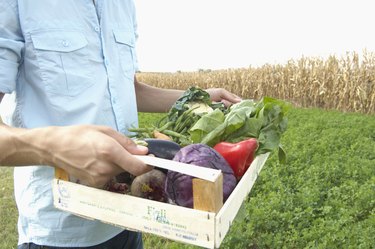
Cleaning vegetables completely before eating them is a relatively modern concern in developed countries, due mainly to the proliferation of pathogenic microorganisms. Whether these microorganisms are more pathogenic or those in developed countries lack appropriate exposure to common microbes in dirt is debated among medical and health authorities. Regardless, soaking raw vegetables in water is relatively effective at sanitizing them, although some nutrients are at risk of being leaching out.
Importance of Sanitizing
Video of the Day
The U.S. Department of Agriculture recommends thoroughly washing all fruits and vegetables with clean water before being consumed to reduce the risk of infection from pathogenic microorganisms, particularly bacteria. Some strains of bacteria can contaminate produce, such as spinach and other leafy vegetables, and lead to food-borne illness in people, especially those with weakened immune systems. For example, E. coli bacteria is commonly found in fecal material and can lead to gastrointestinal symptoms, such as diarrhea and vomiting, if consumed with vegetables and other food. For fruits and vegetables with tougher skin or lots of crevices, the USDA suggests scrubbing them with a brush and rinsing them with water.
Video of the Day
Vinegar and Other Antimicrobials
Most vegetables can be effectively sanitized under clean, running water, but it depends on the type of vegetable and the amount of dirt and pesticides on the outside of the vegetable, according to "Public Health Nutrition: From Principles to Practice." For especially dirty vegetables or those with many folds and crevices, such as broccoli and cauliflower, soaking them in water may be more effective. Rinsing or soaking vegetables with diluted white vinegar -- one part vinegar to three parts water -- is more effective than using tap water. Researchers have discovered that thoroughly rinsing or soaking vegetables in diluted vinegar kills about 98 percent of bacteria, whereas using tap water and scrubbing with a brush eliminates about 85 percent. Other compounds that are effective antimicrobials and appropriate to use on vegetables include fresh lemon juice, colloidal silver and iodine solution.
Leaching Nutrients
Soaking vegetables is effective for cleaning them, but it also leaches out water-soluble nutrients, such as certain vitamins, minerals and phytochemicals that display antioxidant properties, according to "Nutritional Sciences for Human Health." Vitamin C, for example, is susceptible to being leached out. Chopping vegetables into small pieces and then soaking them is even worse because more surface area is exposed to the water and the air, which also oxidizes some nutrients.
Recommendations
Soaking vegetables that are especially dirty or covered in pesticides is an effective way of sanitizing them, especially if some vinegar is added. Avoid cutting the vegetables up before soaking them, and limit the soak to two minutes or less in order to avoid excessive leaching of nutrients. Vegetables such as broccoli or cauliflower that have lots of crevices may require a little more time.